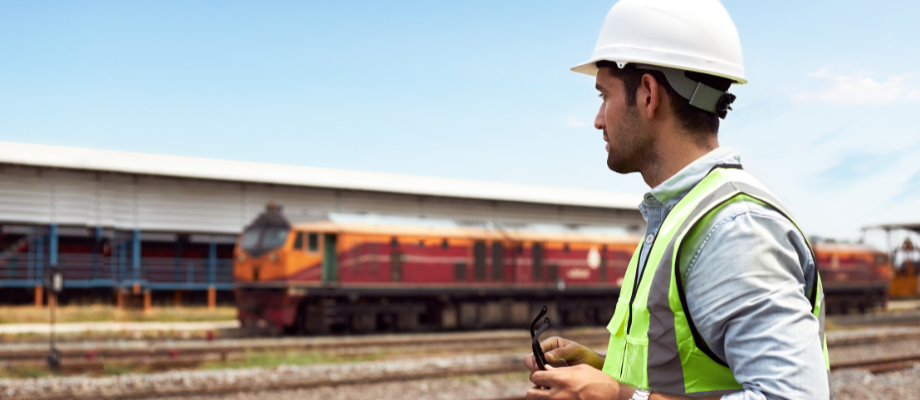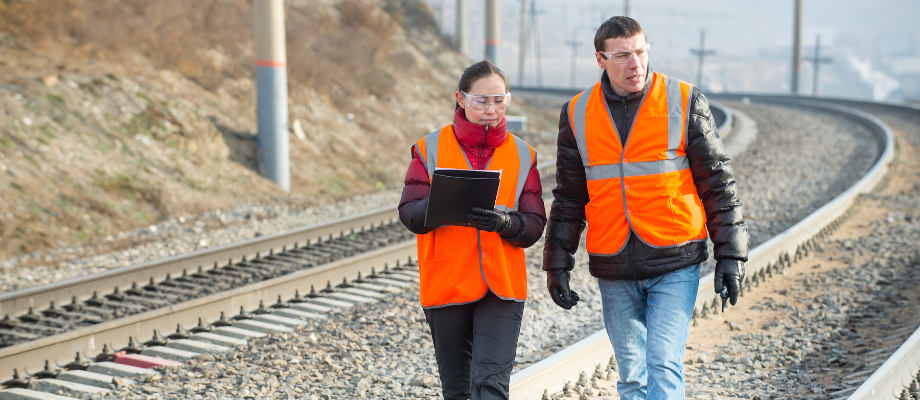Railway engineer


I - What is a railway engineer?
Faced with environmental challenges and the need to reduce CO₂ emissions, the rail sector is emerging as a sustainable and essential transport solution. Thanks to its efficient and less polluting guided transport systems, it contributes to greener mobility. In this context, railway engineers, specialists in rail transport systems, play a key role: they design, maintain and innovate to guarantee the safety and performance of infrastructures.
What are the missions of a railway engineer?
THErailway engineer plays an essential role in this sector, where its missions are varied to ensure the proper functioning of guided transport systems. Here is an overview of the main missions entrusted to it:
1. Infrastructure design and development
One of its primary missions is the designing railway infrastructures. This includes the creation of new track sections, the design of stations and stations, and the planning of signalling and communication systems for rail and urban transport. It must ensure that these infrastructures meet safety and efficiency standards, while taking into account environmental constraints and the needs of users.
2. Feasibility studies
Before launching a project, the engineer carries out feasibility studies to assess technical and economic viability. This involves in-depth analyses of transport needs, associated costs, and environmental impact. These studies are essential to ensure that projects comply with urban planning and safety regulations.
3. Project management
Railway engineers are often responsible for To pilot large-scale projects, by coordinating the various stakeholders, such as subcontractors, design offices, and local authorities. He is responsible for planning, monitoring deadlines, and staying within the project budget. His ability to manage human and material resources is necessary to ensure the success of projects.
4. Infrastructure maintenance
Another key mission is the maintenance existing infrastructures: it must ensure that the lines, equipment and equipment safety comply with standards for optimal functioning. This includes carrying out technical diagnostics, planning preventive and corrective maintenance operations, and supervising the work carried out by maintenance teams.
5. Renovation and modernization of systems
With the evolution of technologies and standards, the railway engineer is also involved in renovation and the modernization of rail infrastructure. This may involve upgrading signaling systems, integrating new communication technologies, or rehabilitating pathways. These projects aim to improve the safety, performance, and capacity of rail networks.
6. Research and development
Railway engineers also participate in research and development projects. This may include studies on optimizing train performance, reducing the environmental impact of transport, or developing new infrastructure management technologies.
7. Data analysis and technology intelligence
Finally, the engineer must constantly analyze data relating to system performance and user needs. He Analyze the results to identify trends, assess the effectiveness of existing systems and anticipate the changes needed to ensure the efficiency and sustainability of rail networks. It also monitors technology to stay informed of new trends and innovations in the sector.
In summary, therailway engineer is a key player in the design, management, and optimization of transport systems. Its varied missions allow it to ensure the safety, performance, and sustainability of rail infrastructures, thus contributing to modern mobility and to reducing the environmental impact of transport.
II - How to become a railway engineer?
Exercising this profession requires a solid academic background and specific skills in the field of guided transport and transport systems. The path often begins with a baccalaureate level oriented towards science, followed by a preparatory class or a BTS in engineering. From there, several engineering school courses offer the possibility of reaching the engineering degree in railway engineering, a specialization that is accessible in engineering schools such as INSA, École Polytechnique, or institutions such as Arts et Métiers.
What degrees do you need to become a railway engineer?
One engineering degree is necessary to exercise this profession. After a Engineering cycle Of three years in Grandes Ecoles or specialized schools in engineering, students obtain knowledge in engineering sciences and in techniques applied to rail transport. Trainings in civil engineering, electrical engineering or mechanical engineering are particularly suitable for working in the railway industry. Some establishments also offer specialized masters to train in the management of complex railway projects or in modelling infrastructures.
What are the courses to become a railway engineer?
Trainings in Engineering school cover a Common core in engineering sciences, with courses in industrial systems engineering, science and technology, and industrial computing. Future engineers can also specialize through training in industrial systems, in industrial maintenance, or in embedded systems to meet the requirements of the railway industry.
Students often follow a course structured in several semesters, combining theory and practice, with internships in companies to obtain a professional experience. Many students choose to train in alternation, which allows them to acquire concrete qualifications and to become familiar with the engineering work in a real situation. Students at the end of the cycle can also complete a End of studies project (PFE), often focused on issues related to infrastructure orcontinuous improvement Of rail transport systems.
Finally, some engineering schools offer the possibility of taking a double degree in partnership with specialized schools, thus offering the possibility of adding a dimension in electrical engineering, civil engineering, or mechanical engineering to initial abilities.

III - What qualities and skills to become a railway engineer?
To excel in this field, several personal qualities and technical skills are required. This profession requires a unique combination of know-how and interpersonal skills, allowing professionals to adapt to the varied challenges of the sector. Railway.
Essential qualities
- Rigor and precision : Railway engineers must be very thorough in their work. The design and maintenance of railway infrastructure require careful attention to detail, as any error can have serious consequences for the security and reliability of systems.
- Analytical spirit : The ability to analyze complex problems and to propose innovative technical solutions is fundamental. This includes understanding the complex systems and interactions between different components of transport systems.
- Team work : Often working in teams with other specialists, such as civil engineers, of electrical engineers, and technicians, have a good sense of teamwork and knowing how to communicate effectively is essential to successfully carry out projects.
- Adaptability : The rail sector is evolving rapidly with the advancement of technologies and new regulations. You need to be able to adapt to these changes and to be continuously trained in new techniques and tools.
Technical skills
- Engineering knowledge : A solid understanding of the principles of civil engineering and railway systems, mechanical engineering and electrical engineering is essential. A mastery of the concepts of sizing And of designing infrastructure, trains and signalling systems is essential.
- Project management skills : Railway projects often involve multiple actors and requirements. The ability to plan, organize and manage a project is therefore fundamental: managing deadlines, budgets and human resources.
- Computer knowledge : The modeling and simulation of railway systems require knowledge in industrial computing. Mastering the tools of CAO (computer-aided design) and project management software is a major asset.
- Technology watch : Be up to date on the latest innovations in the field Railway is indispensable. This includes a good understanding of the systems of telecoms And of robotics applied to railways.
- Research skills : THErailway engineer must also be able to contribute to research projects aimed at improving the performance of railway systems. This may include studies on operational safety, theautomation, or thecontinuous improvement processes.
In short, to succeed in this field, it is essential to have both solid personal qualities and diversified technical qualifications. These advantages make it possible to optimize transport systems and to ensure sustainable and secure mobility in our modern society.

IV - Focus on the design, maintenance and renovation of railway systems
Railway engineers play a role in three key areas: system design, maintenance, and renovation. Each of these aspects is critical to ensuring the safety, reliability, and efficiency of infrastructures.
Railway system design
La designing is one of the main missions of the railway engineer. This process starts with a detailed study of the needs for rail transport. As part of the design, the railway engineer works both in the office, for preliminary studies and system modeling, and externally, to assess constraints in the field. The engineer must design infrastructures that meet demand while respecting safety and sustainability standards.
- Preliminary studies : Before moving on to design, feasibility studies are carried out to assess the various options available. These studies include analyses of geographic characteristics, environmental impacts, and user expectations.
- Technical planning : The engineer then develops detailed plans of the tracks, stations, and signalling systems. This stage requires qualifications in civil engineering, in electrical engineering, and in mechanical engineering, in order to ensure the harmonious integration of all elements of the system.
- Modeling : The design uses advanced modeling tools to simulate the performance of systems before they are built. This makes it possible to optimize the design and to predict future capacity and safety needs.
Railway infrastructure maintenance
Once the infrastructures are put into service, the railway engineer is also responsible for their maintenance. This mission is essential to guarantee the safety of users and the proper functioning of networks.
- Preventive maintenance : The engineer sets up preventive maintenance programs to identify and solve problems before they become critical. This includes regular inspections of tracks, trains, and signalling equipment.
- Outage Management : In the event of a system failure, the engineer must react quickly to diagnose the problem and schedule repairs. This requires mastery of project management to coordinate interventions with maintenance teams and minimize service interruptions.
- Continuous improvement : The railway engineer regularly analyzes maintenance data to identify trends and opportunities for improvement. This makes it possible to optimize processes and increase the safety of infrastructures.
The renovation of existing lines and systems
Over time, infrastructures require renovations to meet the evolution of standards, technologies, and user needs.
- Equipment upgrade : The engineer regularly assesses the state of infrastructure and plans renovation projects to modernize lines, signalling systems and station equipment. These upgrades are essential to ensure the safety and effectiveness of transport systems.
- Integration of new technologies : Technological advances offer opportunities to improve rail systems. The engineer must be on the lookout for new solutions, such as automation, advanced traffic management systems, or hydrogen trains, and integrate them into renovation projects.
- Respect for the environment : As part of renovations, the engineer must also take into account the environmental impact of the work. This includes the use of sustainable materials, the reduction of noise pollution, and the optimization of the energy consumption of renovated infrastructures.
In summary, the designing, the maintenance, and the renovation systems are central missions in railway engineering. These activities not only ensure the safety and efficiency of infrastructures, but also contribute to the evolution and sustainability of rail transport in a world that is increasingly concerned about the environment.
Conclusion
THErailway engineer is a key player in the field of modern transport, playing a fundamental role in the design, maintenance and renovation of railway systems. Thanks to his technical expertise and qualifications in project management, he contributes to ensuring the safety, efficiency and sustainability of infrastructures.
In a context where sustainable mobility and the reduction of environmental impacts have become priorities, this sector is in full evolution. Railway engineers are at the heart of this transformation, integrating innovative technologies and optimizing processes to meet the growing requirements of users and regulations.
Thus, becoming a railway engineer represents not only an exciting and varied career choice, but also a commitment to a sustainable and responsible future. The challenges ahead are numerous, but the opportunities for a positive impact on our society and environment are considerable. By investing in training and skills development, railway engineers will be the pillars of modernized and environmentally friendly rail transport.
Are you looking for a new challenge?
Discover our latest job offers on our Talents website.
To deepen your knowledge of this exciting profession, dive into the articles in our Blog.
Together, let's create the rail networks of tomorrow!
Spontaneous application
Are there currently no offers that match your profile? Share your spontaneous application with us!




